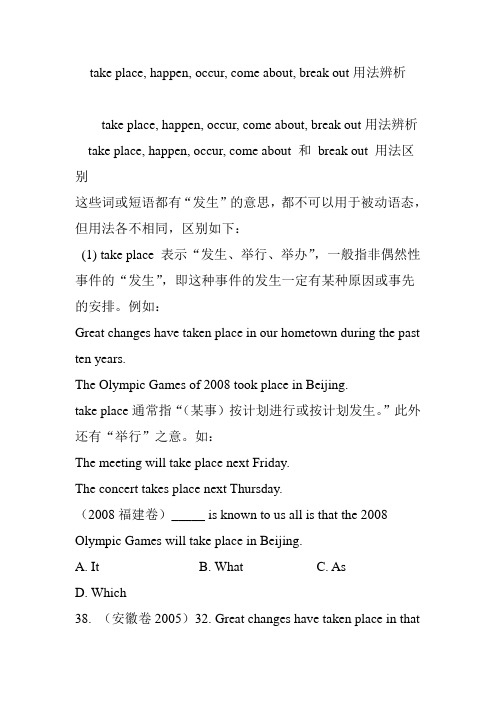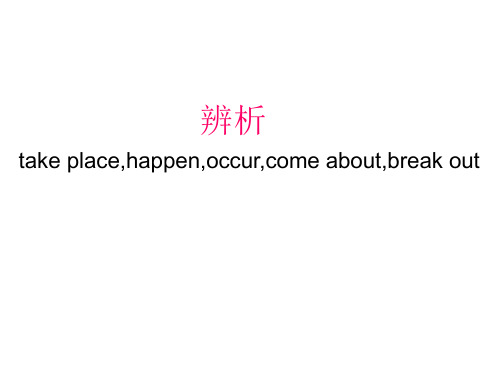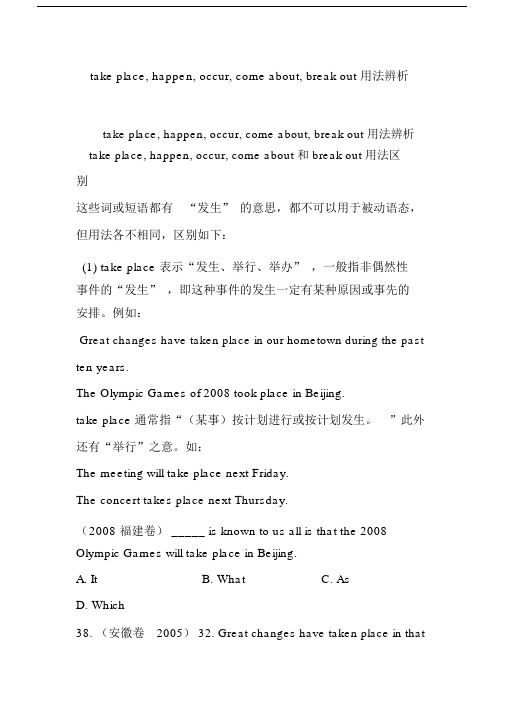takeplace,happen,occur,comeabout,breakout用法辨析
英语中的“发生”happen, occur ,take place,和break out的区别

英语中的“发生”happen,occur ,take place,和break out的区别take place和happen 的区别:(1)、发生的性质不同take place常指按计划“发生”happen往往表示事情的发生带有偶然性, happen是一般用语(2)、主语的条件不同happen常指具体事件的发生,特别指那些偶然的或未能预见的“发生”。
break out 爆发,发生(战争,战斗;意想不到的事情)=occur suddenly爆发;(突然)发生come about表示“发生、产生",多指事情已经发生了,但还不知道为什么,常用于疑问句和否定句(3)、搭配不同take place表示“发生”,可与happen 换用,但其后面一般不接to sb./sth.结构。
break out 爆发,发生=occur suddenly爆发;(4)、occur常用句型It occurs to sb. that 某人突然想起……具体应用1.take place 发生,举行;take place of 代替(1)、She wanted Hugh's wedding to take place quickly她希望休快点举行婚礼。
(2)、This year's event will take place on June 19th, a week earlierthan usual今年的活动将于6月19日举行,比往年提前一周。
(3)、Earlier reports suggested that a meeting would take place on Sunday早先的报道暗示周日可能会召开会议。
(4)、The meeting will take place as planned.会议将按预定的计划进行。
(5)、I'll take place of my father for a while.我将暂时代替我父亲。
happen,occur和takeplace区别

happen,occur和takeplace区别
均为不及物动词
happen指“偶然发⽣”时,主语为“事”;
occur指“发⽣”时可与happen 换⽤,但后接to sb./sth.时,两者含义不同:happen to sb./sth.,主语为⼈时,译为“碰巧”;多指不好的事情发⽣在某⼈(物)⾝上;occur to sb./sth.指“某种思想等呈现于某⼈的知觉中”。
take place 表⽰“发⽣”,可与 happen 或occur换⽤,但其后⾯⼀般不接 to sb./sth.结构;指必然会发⽣的事情时,多⽤take place;此外take place 还可表⽰“举⾏某种活动”。
He happened to know the place.他碰巧知道那个地⽅。
(主语为“他”,⼈作主语)
When did the earthquake occur/happen?地震是什么时候发⽣的?
Didn’t it occur to you to phone them about it?你难道就没想过给他们打个电话?(思想)
Has anything happened to him?他出什么事了吗?(不好)
In 1919, the May 4th Movement took place in China.⼀九⼀九年,中国发⽣了五四运动。
take place, happen, occur, come about, break out用法辨析

take place, happen, occur, come about, break out用法辨析take place, happen, occur, come about, break out用法辨析take place, happen, occur, come about 和break out 用法区别这些词或短语都有“发生”的意思,都不可以用于被动语态,但用法各不相同,区别如下:(1) take place 表示“发生、举行、举办”,一般指非偶然性事件的“发生”,即这种事件的发生一定有某种原因或事先的安排。
例如:Great changes have taken place in our hometown during the past ten years.The Olympic Games of 2008 took place in Beijing.take place通常指“(某事)按计划进行或按计划发生。
”此外还有“举行”之意。
如:The meeting will take place next Friday.The concert takes place next Thursday.(2008福建卷)_____ is known to us all is that the 2008 Olympic Games will take place in Beijing.A. ItB. WhatC. AsD. Which38. (安徽卷2005)32. Great changes have taken place in thatschool. It is no longer ______ it was 20 years ago, _____ it was so poorly equipped./A. what; when B. that; which C. what; which D. which; that (名词)(2) happen 作“发生、碰巧”解,常指具体事件的发生,特别指那些偶然的或未能预见的“发生”,一般用于偶然或突发性事件。
take place,happen,occur,come about,break out

9, 我没有想到汤姆会被选为学生会主席。(occur) (1)It never occurred that Tom would / should be elected/ made chairman of the students’ Union.
(2)It didn’t occur to me that Tom would / should be elected/ made chairman of the students’ Union. 10,I____along the street looking for a place to park when the accident . A.went; was occurring B.went; occurred C.was going; occurred D.was going; had occurred
longer __it was 20 years ago, __it was so poorly equipped.
ቤተ መጻሕፍቲ ባይዱ
A.what;when B.that;which C.what;which D.which;that
5,The computer system _____suddenly while he was searching for information on the Internet. A.broke down B. broke out C. broke up D. broke in
(2) happen 作“发生、碰巧”解,常指具体事件 的发生,特别指那些偶然的或未能预见的“发生”, 一般用于偶然或突发性事件。例如:
A storm happened across the river in another country.
英语写作系列之五:主语做什么时,谓语动词可能用的四种方式

英语写作系列之五:主语做什么时,谓语动词可能用的四种方式1. 主语+ V iWe work.We study.常考的不及物动词有:happen(发生), take place发生,举行), break out(突然发生,爆发,)occur(发生), accur(发生)come about (发生), remain(仍然), stay(呆),exist (存在), live(生活,居住), work(工作), go(去), come(来), graduate(毕业), burst (爆裂;爆发),belong(属于)compete (竞赛)arise(出现,发生)appear(出现),rise(上升)apologize (to sb for sth)(道歉), react(反应react to sb/sb对……作出反应),dive (跳水,潜水)participate(参加,participate in = take part in ), boom (处于经济发展时期),differ(不同,相异),lie(位于,说谎)hesitate(犹豫)give in(屈服give in to sb/sth),2. 主语+ Vt +宾语We study English.常考的只能作及物动词的词有:lose(使失去) seat (使入座)3. 主语+ Vt + 间接宾语+ 直接宾语He gave me some ink. ( He gave some ink to me)My father bought me a pen ( My father bought a pen for me)4. 主语+ Vt + 宾语+宾语补足语Li Ping made the baby laugh.I want you to finish the task.I had my house repairedI saw him singing an English song.译:1,他们大笑了2,我买了一部新自行车3,她告诉了我一个故事4,他使得我很五种简单句及there be 句型1. 主语+ V iWe work.We study.2. 主语+ Vt +宾语We study English.3. 主语+ 连系动词+ 表语They are students.The story sounds interesting.4. 主语+ Vt + 间接宾语+ 直接宾语He gave me some ink. ( He gave some ink to me)My father bought me a pen ( My father bought a pen for me)5. 主语+ Vt + 宾语+宾语补足语Li Ping made the baby laugh.I want you to finish the task.I had my house repairedI saw him singing an English song.6. There be句型There is a car.There are many trees.There is a pen, two books and a bottle of ink in the room.I ‖bought a new bike.She‖told me a story. He‖made me happy.。
take place的同义词组

take place的同义词组“Take place” 同义词组可以有很多,这里列举几个常用的同义词组:1. Occur: 发生、出现。
Occur 是 take place 的一个常见同义词,表示“发生或出现”的意思。
例如:The accident occurred on a busy street.2. Happen: 发生、出现。
Happen 是 take place 的另一个常见同义词,表示“发生或出现”的意思。
例如:The meeting happened last week.3. Transpire: 发生、出现。
Transpire 是 take place 的另一个更少见的同义词,表示“发生或出现”的意思。
例如:Strange things transpired during the night.4. Take effect: 生效、实施。
Take effect 是take place 的另一个同义词,表示“生效或实施”的意思。
例如:The new regulations will take effect next month.5. Be held: 举行、举办。
Be held 是 take place 的另一个同义词,表示“举行或举办”的意思。
例如:The conference will be held in New York.6. Come about: 发生、传出。
Come about 是 take place 的另一个同义词,表示“发生或传出”的意思。
例如:Rumors came about that the company was going bankrupt.7. Occasion: 举行、举办。
Occasion 是 take place 的另一个同义词,表示“举行或举办”的意思。
例如:We are planning to have an occasion for my father's birthday.8. Arise: 出现、发生。
take place, happen, occur, come about和break out用法区别

take place, happen, occur, come about和break out用法区别这些词或短语都有“发生”的意思,但用法各不相同,区别如下:(1). take place 表示“发生、举行、举办”,一般指非偶然性事件的“发生”,即这种事件的发生一定有某种原因或事先的安排,例如:Great changes have taken place in our hometown during the past ten years.The Olympic Games of 2008 will take place in Beijing.(2) .happen作“发生、碰巧”解,一般用于偶然或突发性事件,例如:What happened to you? (一般不说:What did you happen?)Maybe something unexpected happened.I happened to see him on my way home.= It happened that I saw him on my way home.(3). occur作“发生、想到、突然想起”解,其意义相当于happen,例如:What has occurred? (=What has happened?)A big earthquake occurred (=happened) in the south of China last month.It occurred to me that she didn’t know I had moved into the new house.(4). come about表示“发生、产生”,多指事情已经发生了,但还不知道为什么,常用于疑问句和否定句,例如:When Mother woke up, she didn’t know what had come about.I’ll never understand how it came about that you were late three times a week.Do you know how the air accident came about?(5). break out意思为“发生、爆发”,常指战争、灾难、疾病或者争吵等事件的发生,也可以表示突然大声叫喊等,例如:Two world wars broke out last century.A fire broke out in the hospital in the mid-night.After the flood, diseases broke out here and there.She broke out, “That is too unfair!”occur vi. 1发生2 想起,想到常用搭配:sth. occurs to sb.:某人突然想起某事;It never occurred to sb. that…:某人从未想到……More people are afraid to take planes because several air crashes have occurred this month. Suddenly a good idea occurred to her.It never occurred to us that the well-dressed man was a pickpocket.我们决没有想到,那个衣冠楚楚的人是个扒手。
takeplace,happen,occur,comeabout,breakout用法辨析.doc

take place, happen, occur, come about, break out 用法辨析take place, happen, occur, come about, break out 用法辨析take place, happen, occur, come about 和 break out 用法区别这些词或短语都有“发生”的意思,都不可以用于被动语态,但用法各不相同,区别如下:(1)take place 表示“发生、举行、举办” ,一般指非偶然性事件的“发生” ,即这种事件的发生一定有某种原因或事先的安排。
例如:Great changes have taken place in our hometown during the past ten years.The Olympic Games of 2008 took place in Beijing.take place 通常指“(某事)按计划进行或按计划发生。
”此外还有“举行”之意。
如:The meeting will take place next Friday.The concert takes place next Thursday.(2008 福建卷) _____ is known to us all is that the 2008 Olympic Games will take place in Beijing.A. ItB. WhatC. AsD. Which38. (安徽卷2005) 32. Great changes have taken place in thatschool. It is no longer ______ it was 20 years ago, _____ it was so poorly equipped./A. what; when B. that; which C. what; which D. which; that(名词)(2)happen 作“发生、碰巧”解,常指具体事件的发生,特别指那些偶然的或未能预见的“发生” ,一般用于偶然或突发性事件。
- 1、下载文档前请自行甄别文档内容的完整性,平台不提供额外的编辑、内容补充、找答案等附加服务。
- 2、"仅部分预览"的文档,不可在线预览部分如存在完整性等问题,可反馈申请退款(可完整预览的文档不适用该条件!)。
- 3、如文档侵犯您的权益,请联系客服反馈,我们会尽快为您处理(人工客服工作时间:9:00-18:30)。
take place, happen, occur, come about, break out用法辨析
take place, happen, occur, come about, break out用法辨析take place, happen, occur, come about 和break out 用法区别
这些词或短语都有“发生”的意思,都不可以用于被动语态,但用法各不相同,区别如下:
(1) take place 表示“发生、举行、举办”,一般指非偶然性
事件的“发生”,即这种事件的发生一定有某种原因或事先
的安排。
例如:
Great changes have taken place in our hometown during the past ten years.
The Olympic Games of 2008 took place in Beijing.
take place通常指“(某事)按计划进行或按计划发生。
”此外还有“举行”之意。
如:
The meeting will take place next Friday.
The concert takes place next Thursday.
(2008福建卷)_____ is known to us all is that the 2008 Olympic Games will take place in Beijing.
A. It
B. What
C. As
D. Which
38. (安徽卷2005)32. Great changes have taken place in that
school. It is no longer ______ it was 20 years ago, _____ it was so poorly equipped.
/A. what; when B. that; which C. what; which D. which; that (名词)
(2) happen 作“发生、碰巧”解,常指具体事件的发生,特
别指那些偶然的或未能预见的“发生”,一般用于偶然或突
发性事件。
例如:
A storm happened across the river in another country.
What happened to you? (一般不说:What did you happen?) Maybe something unexpected happened.
New things are happening all around us.
I happened to see him on my way home.
= It happened that I saw him on my way home.
It happened that I had no money on me.
高考链接:(2008陕西)He was curious (好奇) to know what was happening in the office. (2008陕西)
高考链接:(江西卷2005)22.—Tom is never late for work. Why is he absent today?
—Something ________ to him.
A.must happen
B.should have happened
C.could have happened
D.must have happened
高考链接:(NMET2006.I) 31. Eliza remembers everything
exactly as if ______ yesterday.
A. was happening
B. happens
C. has happened
/D. happened
(3) occur 作“发生、想到、突然想起”解,其意义相当于
happen。
例如:
What has occurred? (= What has happened?)
A big earthquake occurred (= happened) in the south of
China last month.
It occurred to me that she didn't know I had moved into the
new house.
温馨提示:Sth. occur to sb./ it occur to sb. that…“某人突然想
起…”
高考链接:(2002.上海。
翻译)我没有想到汤姆会被选为学
生会主席。
(occur)
It never occurred/ didn’t occur to me that Tom would / should be elected/ made chairman of the students’ Union.
高考链接:(安徽2006)I along the street looking for
a place to park when the accident .
A.went; was occurring B.went; occurred
/C.was going; occurred D.was going; had occurred
高考链接:(上海2000) An awful accident ___, however, occur the other day.
A. does /
B. did
C. has to
D. had to
(4) come about 表示“发生、产生”,多指事情已经发生了,
但还不知道为什么,常用于疑问句和否定句。
例如:
When Mother woke up, she didn't know what had come about. I'll never understand how it came about that you were late three times a week.
Do you know how the air accident came about?
温馨提示:How did it come about that….?/ How come?“某事情是这样发生的,怎么会发生…样的事情?”
高考链接:(湖北2006) It's already 10 o'clock I wonder how it _______ that she was two hours late on such a short trip.
A. came over
B. came out /C: came about D. came up 高考链接:(江西卷2005)Please tell me how the accident
_______. I am still in the dark.
A.came by B.came upon
C.came to /D.came about
(5) break out 意思为“发生、爆发”,常指战争、灾难、疾病
或者争吵等事件的发生,也可以表示突然大声叫喊等。
例如:Two world wars broke out last century.
A fire broke out in the hospital in the mid-night.
After the flood, diseases broke out here and there.
She broke out, “That is too unfair!”
高考链接:(辽宁2006)The computer system
suddenly while he was searching for information on the Internet. /A. broke down B. broke out C. broke up D. broke in
高考链接:(广东2006) I was still sleeping when the
fire , and then it spread quickly.
/A. broke out B. put out C. came out D. got out。
